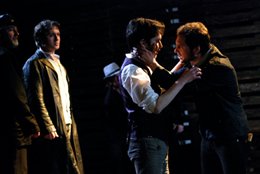This is a stimulating, provocative and deeply-flawed production trying to find a style of its own and to accommodate William Shakespeare to our times. Lianne O’Shea’s world is more board-walk Dublin than Venice – restless, edgy, intimidating and capable of erupting into deep antagonisms and violence. The characters speak almost as if they were texting, incorporating the intonations and gestures of the Noughties: Ross O’Carroll Kelly’s in there somewhere, as is that flappy little wave (‘Hi! I’m here!’) and that oozing sigh of sympathy that’s prompted in some by the sight of puppies or soft toys. It’s a Temple-Bar world; life’s a big laugh. There’s a lot of gesticulating and guffawing among Bassanio and his mates, too hearty by half - although it works in the court scene which is conducted like a spectator sport.
One of O’Shea’s major achievements is to spotlight the contemporary resonances in The Merchant: it has all the ingredients of the lamed Tiger economy – excessive borrowing, punitive interest rates, litigation, the arrogance of affluence built on a fallacy. With a multi-national cast, O’Shea captures, not only an impression of the entrepôt that was sixteenth-century Venice, but even more a flavour of the racial melting-pot Dublin has become. Shylock (an impressive Stave Dvorkin), Morocco (David Fawez) and Aragon (Jefferson Osorio) are treated with suspicion, prejudice and considerable animosity.
There's a lot of keen intelligence at work here, too, never so apparent as in the portrayal of Portia (Susan Barrett). She has all the wooers sussed and dismisses them with callous expediency. She’s every inch the barrister, with a forensic nimbleness of mind, cutting to the chase at breakneck pace, her delivery almost convincing us that her thought-processes move at the speed of light. Her management of the wayward Bassanio in Act V is as efficient as her routing of Shylock in court. This is an actor to watch.
 So what does get lost? The intergenerational tensions – with exceptions in the minor roles, the players are all of an age, so the father-daughter relationship of Shylock/Jessica does not greatly impact. Antonio (Dave Fleming) does not really look like a mercantile entrepreneur in age, dress or demeanour. There’s always been the question why he hangs out with this gang of callow youths: How deep or platonic is his love for Bassanio (Robin Oree)? There was no attempt to give rationale for this.
So what does get lost? The intergenerational tensions – with exceptions in the minor roles, the players are all of an age, so the father-daughter relationship of Shylock/Jessica does not greatly impact. Antonio (Dave Fleming) does not really look like a mercantile entrepreneur in age, dress or demeanour. There’s always been the question why he hangs out with this gang of callow youths: How deep or platonic is his love for Bassanio (Robin Oree)? There was no attempt to give rationale for this.
Shakespeare is good on laddishness and O’Shea plays on this, but the lads in this production are just too exuberant: while physicality in contacts and gestures is very much the order of the day, there’s too much flailing for its own sake.
Another thing missing was a real sense of contact with the audience. Roseanne Lynch (Jessica) was one of the few who drew the spectators in, especially in the chilling final moment, when she holds the stage alone, the Jewess pondering her fate among these Christians. Otherwise, there were too many eyes either raised to heaven or down to the floor, as if eye contact was just too embarrassing.
The cadences of the verse and the significance of single words get buried in the vehement pace of delivery. The subtlety of Shakespeare’s words and phrases that need to be savoured (“void your rheum”; “squandered”) was too often lost. What was needed was less energy, more judgment, more sense of contrast. The production presents the full text, but only in one or two instances (Fawez and Osorio, as the suitors) are the words treated with reflective reverence.
Happening in the chilly bareness of the Complex in Smithfield, the production could have made more of a virtue of the empty space. John Meany’s design kept it bare, the set consisting entirely of pallets and a garden bridge. It’s drab, with no softening or colour, possibly nodding towards a ghost estate. Lighting and costumes are minimal. A series of black-outs between scenes (which become tedious) were superfluous and one wonders why, having put the cast on stage before the audience entered, they didn’t segue into the action, instead of breaking the mood with the cautions about mobile phones.
The starkness suited the racial and fiscal tensions of this bankrupt town, but when the action shifted to Belmont there was no bling (after all, Portia is “richly left”), no sense of how Bassanio spent Antonio’s loan, after he had indicated the only way to win the lady was to put on a show – fashionable clothes, flashy livery for the retinue.
This Merchant does justify the revival; it provokes thoughts about the parallels with our own situation. One excuses the flaws, because they are outweighed by seeing a vigorous cast take on what is, really, a very good play.
Derek West